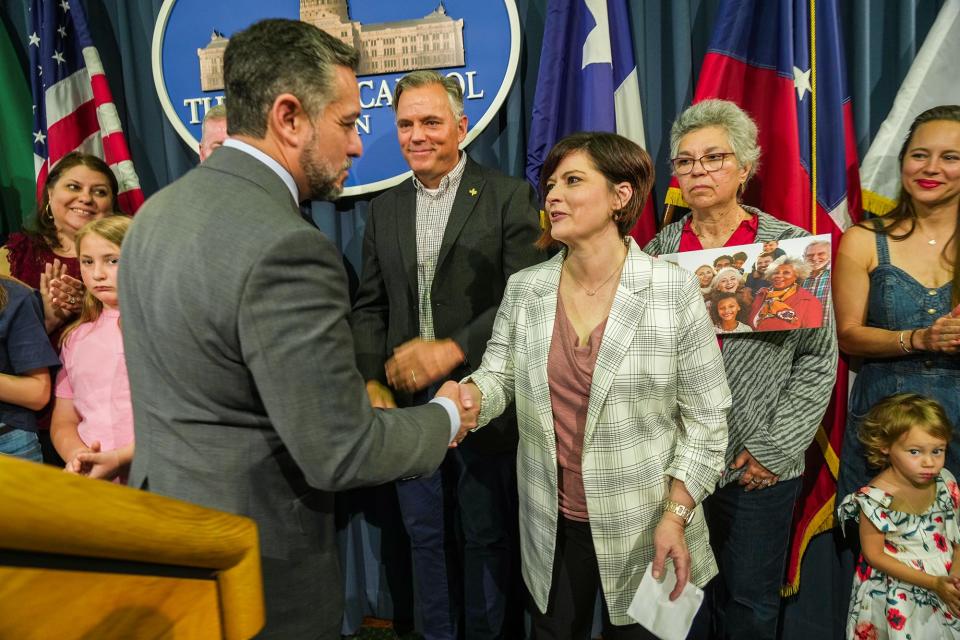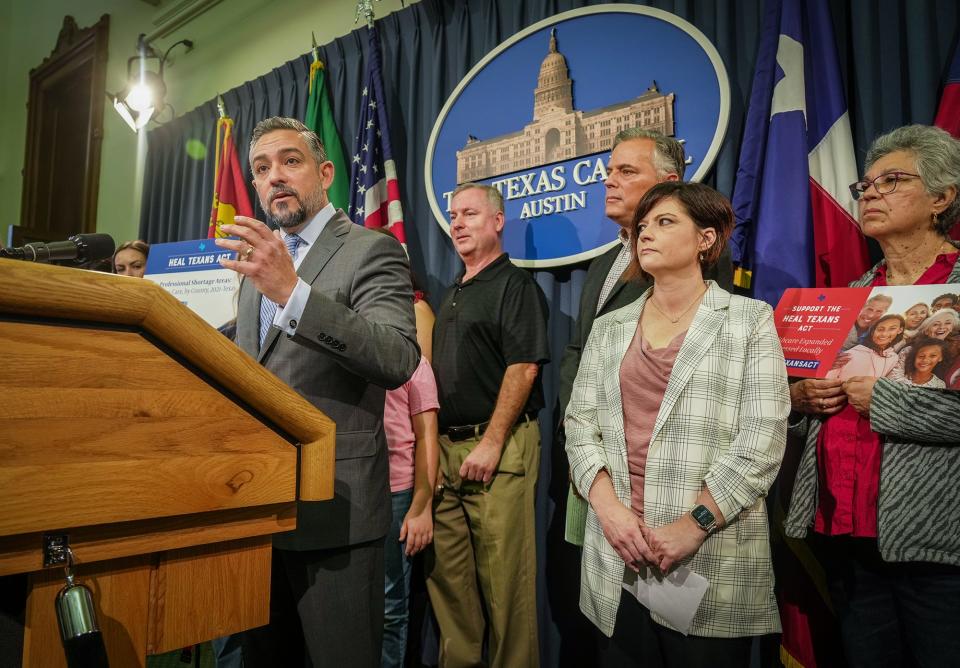Bill seeks to alleviate Texas nursing shortage through supervision reform
- Oops!Something went wrong.Please try again later.
Charity Davis credits a nurse practitioner with helping her get life-saving treatment. The advanced practice registered nurse ran tests on Davis and referred her to a specialist who removed a cancerous cyst on her pancreas.
Davis, though, worries other Texans, in both rural and urban areas, don't have the same luck in finding adequate and available health care, which is why she is supporting a proposal by state Sen. César Blanco, D-El Paso, seeking to eliminate a requirement that limits advanced practice registered nurses' ability to work without physician supervision.
"Almost 20 years later, I'm still cancer free," Davis said. "Had I not had that access to a nurse practitioner I probably would not have been able to come and speak to you today. I really do believe that that care was just very important in saving my life."
Senate Bill 1700 — the Healthcare Expanded and Accessed Locally for Texans Act, or HEAL Texans Act — would remove an occupational licensing requirement that limits advanced practice registered nurses, or APRNs, to providing primary care services only under the authority of a licensed physician.

Blanco's legislation looks to allow APRNs "to practice to the full extent of their professional ability, to evaluate patients, diagnose, order, and interpret diagnostic tests, prescribe medications, and manage the treatment plans of their patients under the exclusive licensure authority of the state board of nursing."
Currently, APRNs are required to check in monthly with a physician to be allowed to provide primary care services. In 2013, the Legislature nixed the on-site physician supervision requirement. With his proposed bill, Blanco hopes eliminating the monthly check-in will bring about better health care outcomes across the state.
"The HEAL Texans Act would allow nurse practitioners to continue to do the work that they have already been doing, just without the administrative barriers and the financial barriers of having a supervising physician," Blanco said at a news conference introducing the bill Tuesday.
More:Poverty wages, exploitative work conditions drive crisis in care for Texas' most vulnerable
Blanco's announcement, however, was met with opposition by a medical group.
During the news conference, Texas Medical Association members tried to talk with Blanco about the bill's legislative intent when he asked for questions from the media. The brief exchange resulted in Blanco releasing a statement Tuesday evening requesting that the medical association make a public apology.
"There will be a time and place to debate the merits of the HEAL Texans Act (SB 1700), but disrupting a patient-oriented press conference was not the place and it was disrespectful to the patients and healthcare advocates," Blanco's statement read. "I am disappointed and sad with the TMA's tactics. While TMA has privately apologized to our office, TMA's apology should be directed to the patients and healthcare advocates who came to tell their stories."
Dr. Gary Floyd, president of the Texas Medical Association, told the American-Statesman on Wednesday that the organization was not being represented by the association members in attendance at Blanco's news conference.
"She was acting on her own accord," Floyd said.
Citing opposition to the SB 1700, Floyd pointed to differences in education and experience between nurses and physicians, also saying that in nearly all cases nurses and physicians work in tandem.
"It's the physician that has the most experience, most education, and they should be the leader of the team," Floyd said. "Nurse practitioners, as well as physician assistants, are important members of that team."
More:Abuse, neglect and death: How Texas fails thousands of disabled residents
Meanwhile, Texas Nurse Practitioners, a nurse practitioner advocacy group, issued a statement supporting Blanco's proposal, saying Texas needs to join the 26 other states that currently allow for "full-extent" practice.
"We applaud the bold, common-sense leadership of Sen. Blanco for introducing this important bill to help make healthcare access significantly more available in Texas’ rural and underserved areas," TNP President Cindy Weston said in a statement. “Removing outdated regulations will allow highly skilled nurse practitioners to step into our state’s healthcare shortage areas and provide much-needed care to more Texans."
Underserved, shortage areas
Texas is second in the nation to California in the number of "medically underserved areas," with 206 such designations across the state, according to data from the Health Resources and Services Administration, an agency of the U.S. Department of Health and Human Services.
At the same time, there are 440 "health professional shortage areas" in Texas, affecting nearly 7.5 million Texans. When considering mental health care professional shortage areas, that figure jumps to 15 million Texans affected.

"Folks, that's 230 counties in the state of Texas," Blanco said. "Ninety percent of the state of Texas is classified as a primary care health professional shortage area."
Outside of Blanco's most recent proposal, lawmakers' push to create opportunity and incentives for health care professionals this session has focused on providing loan repayment options for nurses and grant funding to nursing education programs.
SB 244 by Brenham Republican Sen. Lois Kolkhorst, chair of the Senate Health and Human Services Committee, and matching legislation in the House by Rep. Stephanie Klick, R-Fort Worth, would allow repayment assistance for each year of full- or part-time work for nurse education faculty.
More:Texas law enforcement agencies hope lawmakers will solve state worker shortages
Additionally, grant programs through the bill, which has several bipartisan co-authors, would target investment in facilities that try to address the nurse shortage through education, recruitment and retention.
A similar proposal has also been filed by Sen. Juan "Chuy" Hinojosa, D-McAllen, through SB 408.
Funding for nurse scholarships is also a priority of Lt. Gov. Dan Patrick, the Houston Republican who oversees the Senate.

With SB 25, which had not yet been filed Wednesday, Patrick wants to create new scholarships for registered nurses. Meanwhile, SB 26, also yet to be filed, is a place-setter for legislation looking to increase the number of mental health care beds available in the state, with an emphasis on rural Texas.
At a panel event hosted in January by The Texan, an Austin-based conservative media outlet started in 2019 by former state Sen. Konni Burton, Patrick said the state should help fund education for nurses as existing programs do for doctors, law enforcement officials and teachers.
More:Lt. Gov. Patrick shoots down Speaker Phelan's property tax proposal, lauds school choice
When asked about the longevity of the potential scholarship program, Patrick said it should be everlasting.
"No, that's forever," Patrick said.
"You know, we can afford to do that," he added as he referenced the state's historic budget surplus.
Moving forward, Blanco said he will prioritize working across party lines to advocate for SB 1700 to address the needs of Texans in his district and across the state. He said Tuesday that Patrick had not yet indicated his position on the proposed bill.
"We're talking to Democrats, Republicans; this is not a partisan issue," Blanco said. "This is an access to health care issue."
This article originally appeared on Austin American-Statesman: Texas Legislature: Bill targets nursing shortage through reform

